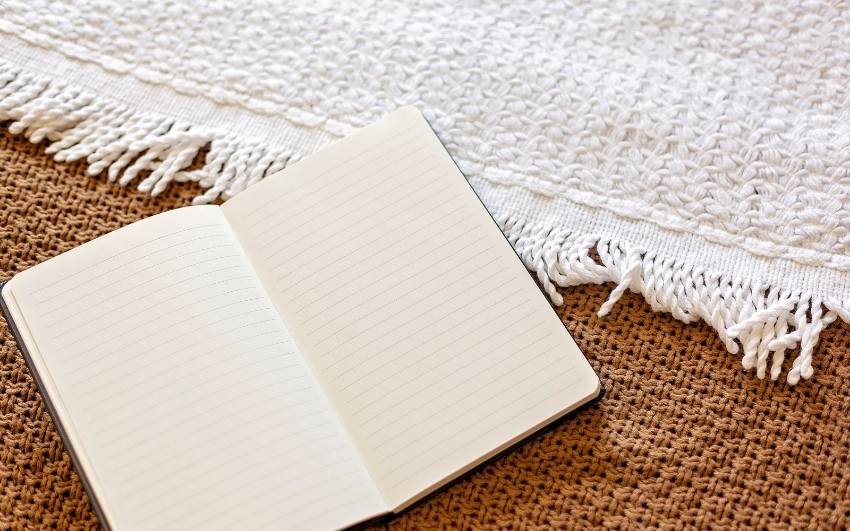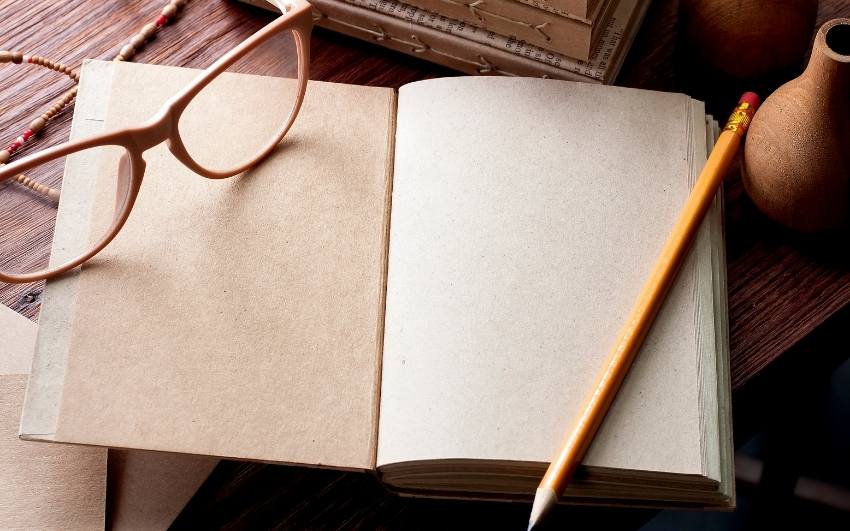On this page

How To Start Journaling and Make It a Habit?
Have you ever considered how to start journaling?
Have you tried it before but failed to keep the practice going? Or are you looking for a different type of journaling? This “guide” can help if any of these concerns are on your mind!
This article will walk you through a seven-step process for starting and keeping a journaling habit.
You’ll discover how to start journaling, accomplish it, and how to incorporate it into your daily routine.
Let’s start with the benefits of mastering this critical manifestation skill.
What Are the Advantages of Keeping a Daily Journal?

How to start writing a journal is relatively easy, but what are the benefits of keeping a journal, is it worth it?
We’ve all heard of celebrities who keep journals, and we’ve all read about them. Have you ever thought whether maintaining a diary can be advantageous to you?
The advantages of journaling are as follows:
- It assists you in leading a more aware existence.
- Stress levels are reduced.
- A tool to assist you in accomplishing your goals.
- Emotional intelligence grows.
- L-theanine helps to alleviate the symptoms of depression.
- Enhances your memory
- It assists you in falling asleep.
- Boost productivity
- Exercise to improve your physical condition.
When you keep a journal, you may also reflect back on significant life events to learn about how you felt at the time. You may learn from other people’s experiences, but it’s as useful to keep track of your own. Our memories fade more into the past as they grow less clear and vivid.
Journaling is a fantastic way to cope with stress in challenging situations.
Two studies from 1997 and 2005 found that writing about traumatic occurrences provides physical and emotional health benefits.
Similar findings were found in a 2002 University of Iowa study, which showed that blogging about traumatic situations changed people’s perspectives on them.
So, if these benefits sound appealing, let’s get started with the seven-step method for developing a journaling habit.
Step #1: Select a Journaling Style

Choosing something to write about is the first step in starting a journaling habit. There are numerous types and alternatives for journaling, which can be confusing.
As a result, the first step is to choose which type of journaling is appropriate for you.
1. Daily Journal
How to begin a journal? Writing in a daily journal or diary is the most common method of journaling. A diary is perhaps consideered more personal, focusing on recording daily events as well as the writer’s thoughts and feelings about them.
It’s a place where you may keep track of major life events like birthdays, anniversaries, births, and deaths.
2. Journaling with prompts
Try writing with prompts to see how your daily routine affects your productivity. These journals remove the “what should I write about” issues, leaving you with specific reflection questions or demands to focus on your work. Frequently, the questions elicit feelings and thoughts that aid in the growth of self-awareness, confidence, and personal development that you might not otherwise have.
Look through this list of morning notebook writing prompts if you’re looking for specific scenarios.
3. Morning journaling
Morning pages are a popular writing exercise among committed activists because they offer me time and space to honestly and truly evaluate their lives.
“Morning Pages” are three pages of longhand, stream-of-consciousness writing done first thing in the morning. They are not works of art. They aren’t “writing” at all. They’re exclusively for your eyes and cover a wide range of topics and everything that comes to mind for you. Morning Pages energize, clarify, calm, cajole, organize, and coordinate your day. Don’t overthink it: jot down whatever comes to mind on three separate sheets of paper…then repeat the process the next day.”
If you’re still undecided about Morning Pages, here’s the lowdown: all you need is a blank notebook (more on that later) and a location to write. If you’re stuck on ideas, here are some morning diary prompts to get you started.
4. Mindfulness journaling
Morning Pages and mindfulness journaling allow you to connect with your emotions and experience the world in the now rather than attaching your thoughts to the past or future, where bitterness and concern are common.
Mindfulness requires paying attention to the small details in your environment, which is a crucial skill when writing. Because it encourages people to pay attention to all they perceive with their senses, mindfulness is likely to improve attention to detail.
Here are two mindfulness journals (with prompts) to get you started if you enjoy writing in a journal.
Mindfulness writing is similar to gratitude journaling. As a feeling and expression, gratitude cannot dwell on the past or fear the future.
You are firmly anchored in the present reality of your blessings when you are appreciative. Gratitude, like other mindfulness exercises, offers several mental and physical benefits.
5. Thankfulness Journaling
If you’re interested in thankfulness writing, you can find several gratitude diaries with questions or prompts, use a blank notebook to record your blessings as you like, or utilize one of the approaches suggested in this chapter.
6. Idea Journaling
Your mind is bursting at the seams with brilliant ideas that strike you at inconvenient moments, such as in the shower, on the run, or just as you’re ready to fall asleep. They fade into the mists of your mind before you can capture them, leaving you dissatisfied that you missed out on a chance.
But what if you were to think more deliberately? What if you made the effort to think and write down your ideas before they vanished?
James Altucher shows how to come up with ideas by brainstorming and writing down ten per day. The main purpose of this procedure is to “work out your idea muscle.”
10 ideas for a new job, a better relationship, ten new chapters for your book, or simply ten odd thoughts that occur to mind. They don’t even have to be good or feasible ideas. The goal is to think and create in the same way as Morning Pages writers do.
Every day, you should expect to come across a couple of these golden nuggets. At least one or two of these will almost certainly improve your life.
7. Keeping a Goal Journal
Do you have a long-term goal in mind, or do you tend to focus on smaller goals? If that’s the case, goal journaling is something you should consider starting. Indeed, we believe that goal writing is useful for everyone because we all want to do something, and when we write it down, it becomes more real and achievable.
It is critical to have a future vision, but journaling about it goes farther. You can get more personal with yourself, your hopes, and your objectives by keeping a goal journal. When you write about your goals in greater detail, it’s easier to generate action steps and solutions.
8. Keeping a Bullet Journal
Bullet journaling has revolutionized the practice of journaling and setting goals, taking the productivity and journaling world by storm. Hundreds of bullet-style diaries are available on Amazon, all based on a design created by a young Austrian emigrant who studied in the United States.
The official Bullet Journal and the bullet journaling application were created by Ryder Carroll, a digital product designer and writer. His own struggles as a child with learning disabilities motivated and pushed him to develop his own methods for being more focused and productive.
To get started, read Ryder’s book “The Bullet Journal Method” and watch this video, which explains the basics of how this journaling method works:
9. Notebook Journal
You are not limited to one type of journaling. Instead, a low-cost lined notebook can be used to create your diary. You can pick and choose from the various parts of the various journaling approaches we’ve examined to create a unique set of prompts tailored to your needs.
For example, you might start your day by writing down three things you’re grateful for, then determine the day’s top goal, and finish with a journal post about the most important lessons you learned the day before.
Step #2: Schedule Time To Journal Every Day

The first step is to determine how often and when you will write in your journal. It’s also vital to remember that the most important component of journaling is attempting to fit it into your schedule, not what you write.
It doesn’t matter what time of day it is as long as it is convenient for you.
If you think the most in the morning, get up 15 to 20 minutes early and write down your thoughts. Make it an evening activity before bedtime if you wish to record everything once work is done (since it helps you relax) (because it helps you relax, you may also discover that you fall asleep faster).
You will gain many more benefits if you write in your diary every day. To keep track of when it’s time to document, I use the ToDoist app on my phone.
We all know that life happens, and you may occasionally forget about a day. If you skip one day, it’s not a big issue, but don’t miss more than two in a row. It’s simple to stop journaling once you’ve completed it, and then you’ll have to start over.
Step #3: Use the Right Journaling Tools

It’s totally up to you how you keep a diary, and the method you employ is less important than whether or not you can do it consistently. According to research, blogging provides some of the same mental and physical benefits as journaling on paper.
If you don’t have much time, start with a handwritten diary and keep it for at least a few weeks. Because you can’t edit your words with a few clicks, your notebook will feel more authentic.
Handwriting triggers the reticular activating system in the brain, according to studies. Whatever you’re thinking about is brought to the forefront of your mind, giving you the opportunity to concentrate on it.
A few tools will assist you choose the finest journaling platform if you wish to start journaling. First, here are the top 11 journal and diary apps if you choose with a digital alternative. Our recommendation is to read this article and select the top two or three apps that interest you. Please choose the one app that makes it easiest for you to develop your journaling habit after testing each for a few days.
If you want to go old school, check out our list of the top 20 greatest journal notebooks. We examine the advantages and disadvantages of each journal in this post so you can decide which one is best for you. (If you need a pen, here are nine of the best no-smudge pens for journaling and note-taking.)
Finally, journaling, like any other habit, requires a daily reminder to be done. It will be simple to forget otherwise. To motivate you to take action, we propose setting up a reminder system.
You can use the traditional method of keeping track of this habit on a calendar or with Post-it Notes, but you can also set up alerts on your phone to remind you to journal. However, in today’s increasingly digital environment, we recommend using an app to track your journaling habit (and any other habits you’d like to create).
These four apps are extremely great, and we adore them:
Step #4: Establish the Ideal Journaling Environment

Everything revolves around you and your emotions. Eliminating distractions is the best way how to start journaling and document your ideas and thoughs. There’s a reason why so many famous authors seek seclusion while writing their novels: it’s easier to focus on writing when there are no interruptions.
This does not mean you have to go to a hut in the woods every time you want to blog; rather, it necessitates some privacy from others. It’s also important to keep yourself away from electronics while writing in your journal right now.
Here are some ideas for setting up your environment:
- Turn off the stupid box (television)
- Turn off your computer
- Please refrain from using your cellphone (or turn it off)
- Find a quiet corner of your house apart from the rest of the family
- Get up before everybody else in the morning
- The important thing is to make sure you won’t be disturbed if you receive a notification
This will limit your journaling and writing to personal topics.
If you want to make sure that you keep up with your journaling, make it a part of your daily routine. To learn more, follow these seven steps to create an effective morning ritual:
Step #5: Write A Journal But Keep Your Information Private

Even if you don’t care whether people read your diary, keeping it private is essential. You might not mind if someone reads your journal, but you won’t be really honest if you don’t believe your ideas are private.
You could be concerned about how others will react if you write about certain topics. This nervousness may keep you from writing in your journal about essential topics.
When you start a journal, you never know who will read it. As a result, you should take particular steps to safeguard your journal as much as possible. The simplest method is to keep your journal with you at all times. It’s also useful because you can jot down thoughts if anything important occurs or if you suddenly become inspired.
You should also avoid showing anyone your diary, particularly the cover. Keep it hidden in your bag. If individuals you trust see your journal, they will be more tempted, so keep it out of sight and mind.
Step #6: How To Start Journaling

This section’s ultimate purpose is how to start journaling by getting your ideas down on paper.
Open your writing journal (or app) and start writing down your ideas when you’ve decided on the type of journaling you’ll undertake and created the right environment.
So, here are some pointers to help you get the most out of your journaling session:
6.1 Each journal entry should be dated
If anything is important enough to document, it is also crucial to date your diary entries. These are your ideas, but you’ll probably certainly return to them in the future. With a date next to each entry, you can see how your thinking changed when major life events occurred.
You can also track your progress over time. As previously stated, memories fade with time. If you don’t date your diary entries, you’ll just have a hazy impression of when you wrote them.
Let’s take it a step further and say you decide to make your diary public. If there are no dates, readers will have no way of knowing when events occurred because there will be nothing to compare them against.
Another incentive to date all of your entries is that it is straightforward and quick. Depending on the month, you must fill in the blanks with five or six digits.
To customise how you date your daily diary, you can incorporate dated products like receipts with particular remarks.
6.2 Be sincere with yourself
Keep in mind that this is your own personal journal. It’s vital to be honest with oneself in daily writing — otherwise, what’s the point?
Respect your journal as a reflection of your thoughts and feelings, and don’t be afraid to express yourself. Be upfront and honest about your feelings because if you can’t be honest with yourself, you won’t be able to be honest with anyone else.
Don’t try to appear more appealing by pretending to be someone you’re not. Allow yourself to say what you really think rather than what you think should happen.
Having trouble deciding what to write in your daily journal?
Tell us the first thing that comes to mind. What comes to mind initially is usually the most important item to you at the time. If you have a specific issue that has been bothering you, use your notebook as an opportunity to examine it from various angles.
When you write about a problem, you may see it from a different perspective. You might be able to see a problem through the eyes of another person, or writing about a problem may help you realize that it isn’t such a huge concern after all.
6.3 Keep it simple and clean
When I first started journaling, my primary issue was that I would spend too much time looking for the perfect method to describe what I wanted to say.
In the same way that I do on this blog and in my books, I want to communicate my thoughts clearly and beautifully.
Write down any simple thoughts that come to mind. However, journaling isn’t meant to be a written assignment. If you strive to journal well constructed terms, you won’t get nearly as many ideas on paper. It will take you longer to journal. The sense of achievement you felt when you finished your task will fade with time, leaving you feeling like a drudge. Furthermore, you will be dissatisfied with the way you wrote your journal entry.
Perfection is impossible to accomplish, and attempting to do so is a waste of time. As your genuine feelings occur, write them down. Remember, you’re not writing a novel or a college term paper. The quality and scope of your work aren’t stressed in journaling.
6.4 Don’t make yourself a censor
Would you suppress your own thoughts? Certainly not!
So, why should you proofread your diary entries? This is one of the advantages of keeping a private journal. When you know your journal is exclusively for your eyes, you have the freedom to express yourself without worrying about other people’s ideas or opinions.
Don’t be concerned about your spelling or grammar while you write, no matter how good or bad it is. Make a few sentence adjustments or ignore the formal syntax requirements if you can understand what you’ve written in each entry.
Step #7: Maintain Your New Journaling Routine

It would be a lot easier if you could develop any habit in one night, but it requires time and effort. It’s probable that developing a habit of journaling will take some time.
That is why it is so important to develop a journaling regimen.
How to begin a journal, don’t try to form multiple habits at the same time. Because everyone has a limited quantity of willpower, spreading it over several new behaviors diminishes your chances of success.
Many people abandon their New Year’s resolutions as a result.
To get the most out of your journaling habit, make it your top priority, commit to it for at least 30 days, and link it to another pre-existing habit.
Consider journaling every morning while you drink your coffee if you start your day with one.
If 20 minutes seems daunting, start small by writing one paragraph per day.
This makes accomplishing your goals easier, and you’ll naturally start generating more after a while.
Last Thoughts on Developing a Journaling Habit
Because journaling is a vital part of my life and benefits me on a daily basis, I produced this guide.
I know how tough it is to build new habits since I’ve been there, which is why I want to help people how to start journaling daily.
The 5-, 10-, or 20-minute investment is certainly worth it. If I promise you that it will be worthwhile, you will learn more about yourself, lessen your stress levels, and have a record of your life to refer to in the future.
Faqs
How to write a journal?
Some people like to write very structured and linearly, while others prefer to let their thoughts and feelings flow more freely. Some mix both styles or even change their approach from time to time.
How to start journaling daily?
How to start journaling daily? Well, some people like to write first thing in the morning as soon as they wake up, while others prefer to do it at night before bed. Some journal throughout the day whenever they have a free moment. Ultimately, the best way how to start journaling is the way that works best for you. Experiment and find what feels most natural and effective for you.
How often should I journal?
Again, there is no one answer to this question on how to start journaling and how often. Some people journal every day, while others do it less frequently. The important thing is to be consistent with your journaling. If you find journaling too much, try every other day or a couple of times a week. The key is to be consistent in seeing the benefits of journaling.
What are alternatives to journaling?
If you find that journaling is not for you, there are other ways to process your thoughts and emotions. Some people find it helpful to talk to a therapist or counsellor about their feelings. Others prefer to express themselves through art, music, or writing poetry.
What are the many ways to start a diary or writing journal?
There is no one “right” way to start a writing journal. Some people start by writing about their day-to-day experiences, while others prefer to write about their thoughts and feelings. Some people use their journal to track their goals and progress, while others use it as a space to express themselves creatively.
Related:

Petri Maatta is a mindset coach and neuroscience-focused author with 15 years of experience in personal transformation and success psychology. After seven years of business failures, he discovered the power of manifestation through a Fortune 500 mentor. Now, he shares neuroscience-backed strategies through DreamMaker membership, helping others transform their businesses and lives on their own terms.
Read My Story here.
Share This Story, Choose Your Platform!
You want to manifest a new car, but you’re wondering: Does this really work? Here’s
Many smart individuals are often linked with having a high IQ. However, according to emotional
According to online dating statistics over 90% of people believe in love at first sight,




